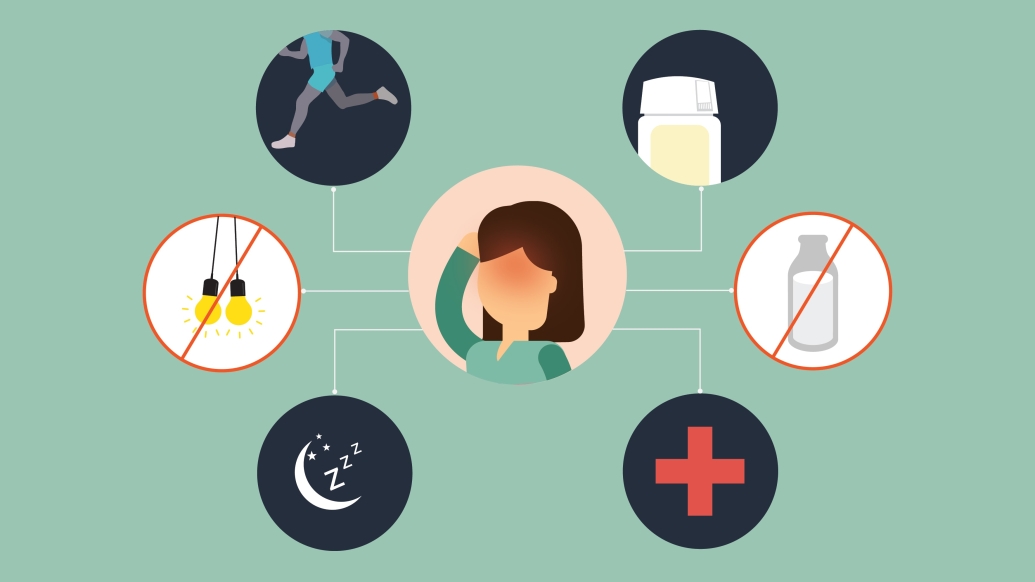If headaches or migraines throw off your daily routine, it’s time to home in on causes and seek treatment.
7:00 AM
Author |

The World Health Organization estimates at least 50 percent of adults have had a headache or migraine in the past year. But not every headache or migraine has common causes — or treatments — which is why it's important to know what will work best for you.
SEE ALSO: Headache During Pregnancy: Why It Happens and What to Do
With this in mind, neurologist and headache specialist Lauren A. Aymen, D.O., shares some of the most commonly asked questions about headaches — along with red flags, medication suggestions and guidelines for treatment.
What is the difference between a headache and a migraine?
Aymen: Headache is an umbrella term that encompasses several types of headache disorders. Migraine is a type of headache with a combination of symptoms. The pain can be unilateral or bilateral and is commonly described as throbbing or pounding with associated sensitivity to lights, sounds and odors. Many patients experience nausea and/or vomiting as well. The pain is moderate to severe and has a significant impact on a person's ability to perform their regular daily activities. Many migraine patients will lie down in a dark and quiet room during a migraine attack. Most of the people we see in our clinic have migraines.
Are there red flags people with headaches should be aware of?
Aymen: If you have a history of headaches and your headaches suddenly change in location or become more frequent or severe, this may be a sign to talk with your doctor.
Other concerning changes are:
-
Waking up with headaches
-
Headache with fever
-
Headache with confusion or decreased consciousness
-
Headache with a focal neurologic deficit (weakness, numbness or vision change)
-
Sudden or abrupt onset of headache
-
Change in headache pattern or characteristics (location, frequency or intensity of pain)
Any of these changes would warrant an exam by a doctor and/or perhaps some imaging such as an MRI of the brain to exclude the possibility of a more serious condition such as tumors, strokes or vascular abnormalities.
Do food, sleep and exercise have an effect on headache?
Aymen: They certainly do. The good news is that lifestyle changes could eliminate or significantly reduce some headaches altogether.
SEE ALSO: For Cardiac Success Story, Survival Starts with Self-Awareness
Often, people don't have food allergies, but they have food sensitivities that can bring out headache. The three big offenders are gluten, egg and dairy. Those three categories are in several of the foods we eat and can be difficult to identify. Sometimes we recommend elimination diets for six to eight weeks to see if there is any headache improvement. If there's no change, then it's unlikely to be contributing.
Another source for headaches is poor-quality sleep. It's essential to practice good sleep hygiene. Going to bed and waking up around the same time every night is important. Also, getting at least seven to eight hours of uninterrupted sleep per night is also necessary. In addition, patients with undiagnosed obstructive sleep apnea can experience headaches predominantly in the morning.
A good way to prevent headache is to exercise regularly. I usually have patients start with 10 minutes per day at least three days per week. Any activity that increases heart rate can help the body protect itself against pain. When we exercise, our bodies release chemicals called endorphins, which interact with receptors in our brain that reduce our processing of pain.
Which over-the-counter medications or supplements help alleviate headache?
Aymen: Any type of nonsteroidal anti-inflammatory medication (NSAID) such as Motrin, Aleve or Advil is more powerful than acetaminophen. I also advise using daily magnesium supplements — preferably magnesium glycinate or magnesium oxide.
Other supplements include riboflavin (also known as vitamin B2), Coenzyme Q10 (CoQ10) and omega-3 fatty acids.
How severe or frequent do headaches have to be to seek medical care?
Aymen: When headaches are impacting a person's ability to perform their activities of daily living, they should seek treatment from a physician. For example, if you have few headaches a month, but those headaches are so severe that you can't function, can't go to work, can't be with your kids or can't perform any of your responsibilities, this is very concerning to me. I want patients with debilitating headaches to have a plan in place and effective medications to use when they get a headache. A headache should not stop them in their tracks. Improving functionality and quality of life is key.

Explore a variety of health care news & stories by visiting the Health Lab home page for more articles.

Department of Communication at Michigan Medicine
Want top health & research news weekly? Sign up for Health Lab’s newsletters today!





